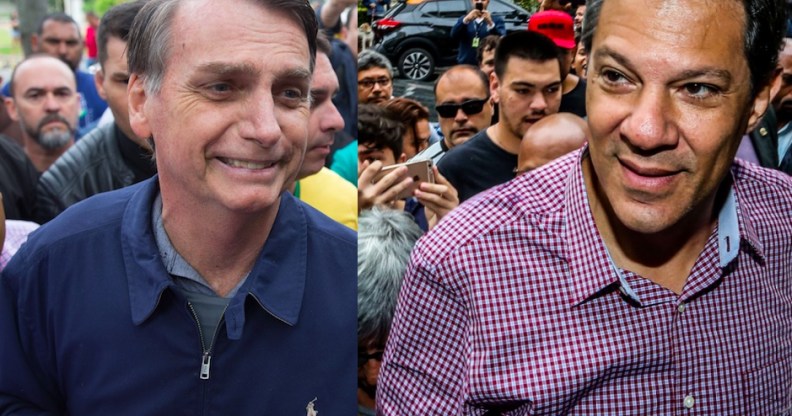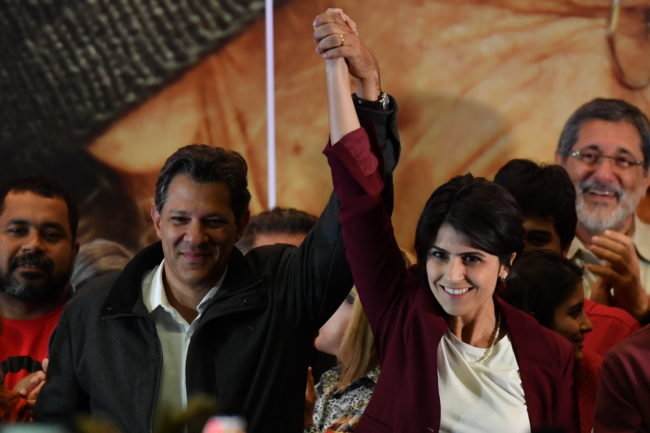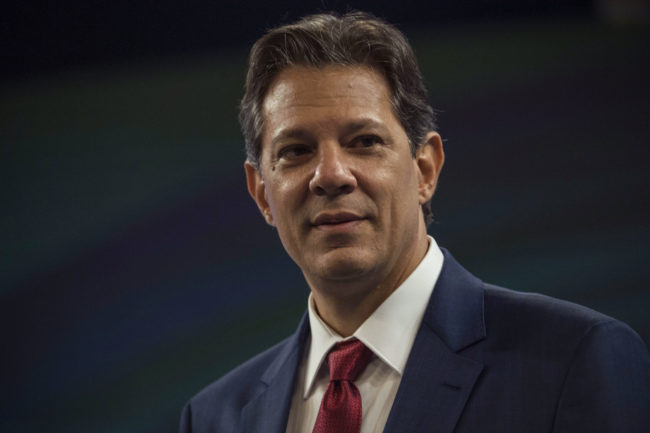Who is Fernando Haddad? Brazil’s last hope against anti-LGBT Jair Bolsonaro

Jair Bolsonaro (L) and Fernando Haddad (R)
Brazil’s left-wing candidate Fernando Haddad has advanced to the second round of the country’s presidential election, where he will face far-right candidate Jair Bolsonaro.
The Social Liberal Party (PSL) candidate Bolsonaro was the winner of the first election round on Sunday (October 7), failing short of the 50 percent outright majority, but nonetheless accruing 46 percent of the vote.
Haddad, the candidate for the Workers’ Party (PT), who was selected to replace Lula Da Silva on the ballots in September after a court barred the convicted former leader from running, received 29 percent of the vote.

Brazil’s presidential candidate for the Workers’ Party (PT), Fernando Haddad and the vice-president candidate Manuela D’Avila hold their hands up after the first round of the general elections at a hotel, in Sao Paulo, Brazil, on October 7, 2018. (Nelson Almeida/AFP/Getty)
The remaining 25 percent of the votes went to the other 11 candidates who ran for president.
Haddad will need to unite those non-Bolsonaro voters to defeat him on October 28, as the former military officer and Rio de Janeiro lawmaker, who has a record of racist, sexist and homophobic attitudes, has consistently been leading the polls since Lula dropped out of the race.
The contrast between the two candidates, particularly on LGBT+ rights, could not be starker.
Haddad vs. Bolsonaro
As education minister both under Lula and his successor Dilma Rousseff—until 2012, when he successfully ran as mayor of Sao Paulo—Haddad was responsible for championing an anti-homophobia initiative in schools that Bolsonaro strongly opposed and that Rousseff eventually suspended.
Haddad has renewed his focus on homophobia in his campaign, promising to criminalise homophobia and transphobia, as The Huffington Post Brasil reported.
Haddad has attacked Bolsonaro for his views on women, minorities and LGBT+ people, saying the far-right leader has a “psychological problem.”
The Workers’ Party candidate, however, wished his rival a speedy recovery from the stabbing attack he suffered during a campaign rally last month.
“I hope that God gives Bolsonaro health,” Haddad said at a rally on October 2, adding: “I hope he lives 120 years for him to see that the world he has in his head is not the world he will have in Brazil.”
Haddad also plans on a nationwide rollout of a programme developed in Sao Paulo called Transcidadania, which aims to provide grants to transgender individuals so they can complete their education and acquire professional training.

Brazilian presidential candidate Fernando Haddad (PT), takes part in the last presidential debate ahead of the October 7 general election on October 04, 2018. (Daniel Ramalho/AFP/Getty)
Brazil has seen a rise in hate crimes against the LGBT+ community in the past few years. The country’s oldest LGBT watchdog, Grupo Gay da Bahia, revealed in September that more than 300 people had been killed in anti-LGBT+ hate crimes so far this year.
Among them was openly lesbian politician Marielle Franco, whose assassination in her native Rio de Janeiro in March sparked protests across the country.
This general election, however, saw a record-high number of transgender candidates running for office—54 compared to the five that ran in 2014—including Tifanny Abreu, who became the first trans woman to play in Brazil’s female volleyball premier league.

